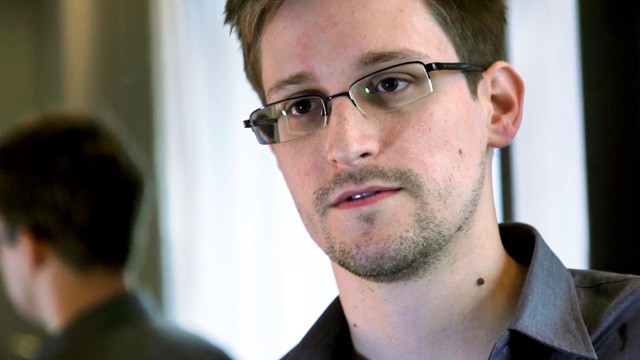It's depressing that if this guy wants to avoid prison time or death, he has to go to insanely repressive countries for asylum. Everyone knows that Russia, Hong Kong (which, ultimately, is no different than China), and (if he makes it there) Ecuador have far less freedom and much more government surveillance than the US. Those governments' only real interests in this are potentially gaining secrets from Mr. Snowden and using the incident to humiliate the United States government. When captured US military, other government personnel, and private citizens try to use the Geneva Convention to demand their rights from hostile countries, they're more likely to be scoffed and laughed at, whether their reasons for detainment are legitimate or not. And when our government tries to exercise diplomatic pressure on those countries for oppressing their people, can we expect them to take us seriously? Our leaders traded those things away awhile ago in what they claim is the interest of national security, but how many of us believe that anymore? Hopefully this eventually leads to the restoration of certain freedoms here. Which, ironically, would mean that all of the work by the oppressive governments who are assisting Mr. Snowden would backfire on them.
Btw all emphasis and the "[sic]" in the article down there are from myself.
- Tim
Snowden on the run, seeks asylum in Ecuador
By Phil Black. Catherine E. Shoichet and Holly Yan, CNN
updated 1:39 PM EDT, Sun June 23, 2013
Moscow (CNN) -- The man who leaked details of U.S.
government surveillance programs was on the run late Sunday,
seeking
asylum in Ecuador with the aid of the anti-secrecy group WikiLeaks, the
organization and Ecuador's Foreign Ministry announced.
Edward Snowden, the
onetime contract analyst for the National Security Agency, left Hong
Kong after the U.S. government sought his extradition on espionage
charges, WikiLeaks said. He landed in Moscow, where a CNN crew spotted a
car with diplomatic plates and an Ecuadorian flag at the Russian
capital's international airport.
WikiLeaks, which
facilitates the publication of classified information, did not disclose
what country would be Snowden's final destination. But Ecuador has
already given WikiLeaks founder Julian Assange refuge in its embassy in
London for nearly a year after he unsuccessfully fought extradition to
Sweden in British courts. And Washington is asking
Ecuador, as well as Cuba and Venezuela, not to admit Snowden, a senior
Obama administration official told CNN on Sunday. The United States also
is asking those countries to expel him if they do admit him, the
official said, and a a source familiar with the matter told CNN that the
U.S. government has revoked Snowden's passport.
Snowden "left Hong Kong
legally" and is headed to Ecuador "via a safe route for the purposes of
asylum," WikiLeaks said in a statement issued Sunday afternoon. He is
accompanied by diplomats and lawyers for WikiLeaks, including former
Spanish judge Baltasar Garzon, according to a statement from the
organization. "The WikiLeaks legal team
and I are interested in preserving Mr. Snowden's rights and protecting
him as a person," said Garzon, who also represents Assange. "What is
being done to Mr. Snowden and to Mr Julian Assange -- for making or
facilitating disclosures in the public interest -- is an assault against
the people." Snowden has admitted he
was the source who leaked classified documents about the NSA's
surveillance programs to the British newspaper the Guardian and to The
Washington Post. The documents revealed the existence of programs that
collect records of domestic telephone calls in the United States and
monitor the Internet activity of overseas residents.
The revelation of the
leaks rocked the Obama administration and U.S. intelligence community,
raising questions about secret operations of the NSA and whether the
agency was infringing on American civil liberties.
Hong Kong: Extradition request didn't comply with requirements
Snowden left Hong Kong
on Sunday "through a lawful and normal channel," the government of the
semi-autonomous Chinese territory said Sunday. The U.S. government
anounnced [sic] Friday that it was charging Snowden with espionage and theft
of government property and asked Hong Kong authorities to hold him for
extradition proceedings.
In a statement Sunday,
Justice Department spokeswoman Nanda Chitre said Hong Kong authorities
had informed U.S. officials of Snowden's departure.
"We will continue to
discuss this matter with Hong Kong and pursue relevant law enforcement
cooperation with other countries where Mr. Snowden may be attempting to
travel," she said.
The U.S. government had
also asked Hong Kong to issue a provisional arrest warrant for Snowden,
the Hong Kong Special Administrative Region said in a statement. But
HKSAR officials said there were problems with the request.
"Since the documents
provided by the U.S. government did not fully comply with the legal
requirements under Hong Kong law, the HKSAR government has requested the
U.S. government to provide additional information," Hong Kong officials
said.
Because Hong Kong didn't
have enough information, "there is no legal basis to restrict Mr.
Snowden from leaving Hong Kong," the government said.
A Justice Department
official said Sunday that the United States had met requirements with
its request, disputing the assertion from authorities in Hong Kong.
"They came back to us
with a few questions late Friday and we were in the process of answering
those questions," the official said. "We believe we were meeting those
requirements. As far as the relationship with Hong Kong goes, this
raises questions and we will continue to discuss with authorities
there."
Hong Kong's lack of intervention came after Snowden told the South China Morning Post that U.S. intelligence agents have been hacking computer networks in Hong Kong and mainland China for years.
Hong Kong said it wanted to have some words with the United States about that.
"The HKSAR government
has formally written to the U.S. government requesting clarification on
earlier reports about the hacking of computer systems in Hong Kong by
U.S. government agencies," Hong Kong officials said in the same
statement. "The HKSAR government will continue to follow up on the
matter so as to protect the legal rights of the people of Hong Kong."
To read the rest of the article, go here:
http://www.cnn.com/2013/06/23/politics/nsa-leaks/index.html?hpt=hp_t1
.













